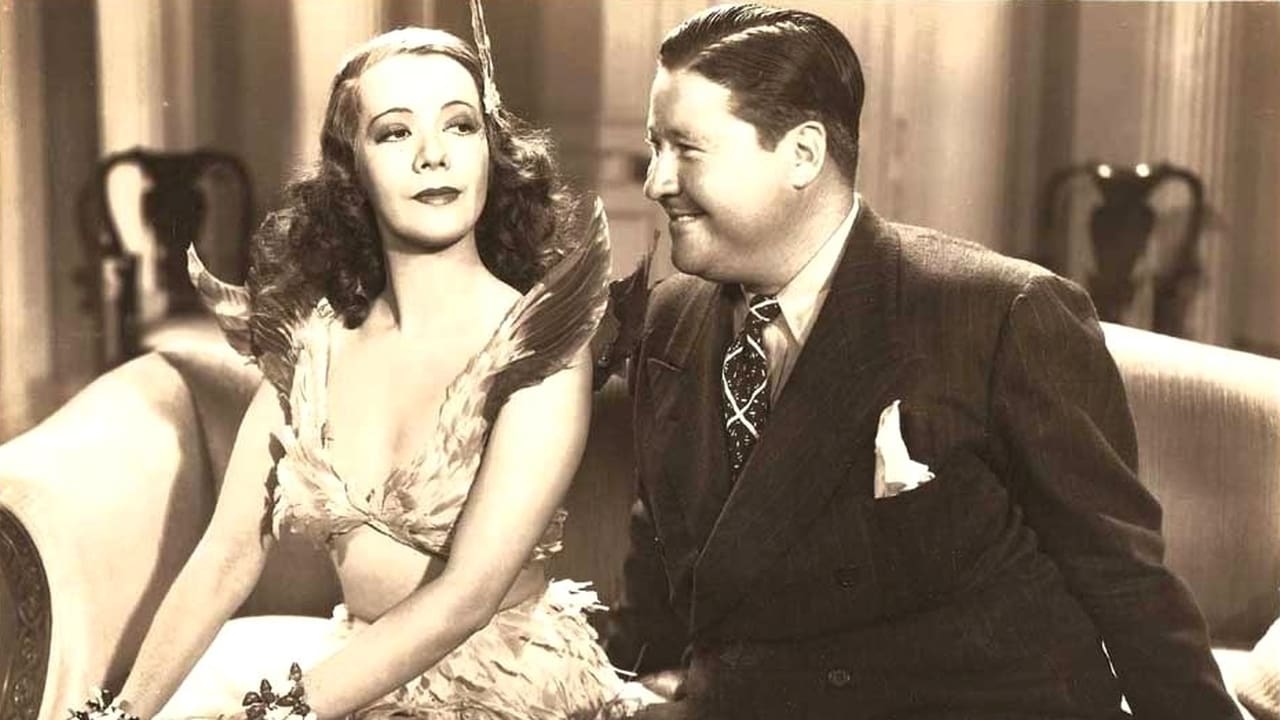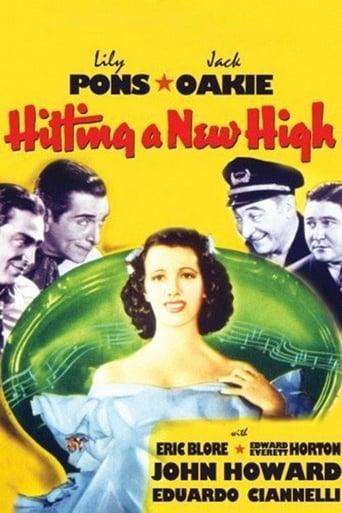

In the old days, studios would bring opera stars into movies. Some were successful - Nelson Eddy, Jeanette McDonald, Grace Moore, Lawrence Tibbett, Lauritz Melchior, Tony Martin, Mario Lanza and others. A few made a stab at it but weren't quite right. Lily Pons is one of those.When Pons was in her sixties, I was a young student studying voice and for some reason my mother was always throwing her in my face. I have no idea why - she would occasionally show up at a gala and there's no way she had any high notes at that age - your cords thicken - so I have no idea what she was doing.Anyway, she was very famous. For some reason, again in the old days, opera houses didn't mind that these singers had voices the size of a mosquito. Unreal. Pons stars here in "Hitting a New High" from 1937. She plays Suzette, who sings with her boyfriend's (John Howard) band, but her heart is in opera, and she wants an audition with the great opera impresario Mr. Mazzini (Eduardo Cianelli) desperately. When she meets a big patron's assistant Corny (Jack Oakie), she tells him that she will do anything to get in to see Mr. Mazzini.Corny arranges for his boss Lucius Blynn (Edward Everett Horton) to "discover" Suzette in the jungle and bring her back to New York. When he first sees her, she is singing to the birds and can't speak English. They call her the "Bird Girl." Blynn brings her back to New York, fixes her up with a vocal coach, and then tries to convince Mazzini to hear her. Suzette has gotten a lot of publicity as the Bird Girl but her boyfriend Jimmy insists that she sing with his band in the evening. One night, Mazzini hears her and thinks he's made a great discovery.The movie was amusing, thanks to Eric Blore as a band member who tries to get money from Blynn by saying he's Bird Girl's long lost father, Edward Everett Horton, and Jack Oakie.Pons sings Air du Rossignol, Je suis Titania, and the Mad Scene from Lucia. Pons was a smart woman and very fashionable; she was pretty and petite. Her signature role was Lakme, which is not done much today. Pons was a true coloratura, the highest soprano voice, and stuck with those roles. She did not have much of a middle voice; real coloraturas don't. She did have an excellent, fast coloratura technique; some of her high notes were better than others. She could be a very exciting singer. Like many female singers from that era, her voice was small. But at least she stuck to her repertoire - I mean, Jeanette MacDonald sang Tosca which is ridiculous. She retired in 1973 - I have no idea what she sang at that point.This film was a major flop, and Pons' last that wasn't a "concert film." Well, my mother always liked her.
... View MoreThis is an often very funny movie, with something of a hole in the middle of it.Lily Pons, though a fine singer and an attractive woman - who didn't photograph well, at least in this picture - did not have the charisma to carry off a movie. If you compare her to Jeannette MacDonald or Grace Moore, her equivalents at MGM and Columbia, you will see what I mean. She isn't helped by the fact that she is given an unsympathetic role. Rather than another replay of the singer who dreams of singing opera and disdains popular music, this movie would have been much better if she had been presented as a singer who wanted to do both, and fight against the prejudice that held that opera singers shouldn't do popular music. The best numbers in this movie are when she does pop music - especially "Hitting a new high" - so her disdain for them doesn't make her attractive to the audience. The staging of the Mad Scene from Lucia di Lammermoor is downright bad, and would have confirmed opera-haters' views of why opera wasn't interesting. She just walks around with her arms extended gazing up at the sky. You would have NO idea what the number, a very dramatic one, is actually about from watching her performance of it in this movie.What makes this a fun movie is the character parts - Jack Oakie, Edward Everett Horton, and Eric Blore - who are given really first-class material and a LOT of screen time, with which they do a really first-class job. Oakie and Horton come off as a quirky couple, with Horton as the straight man and Oakie as the guy with all the jokes. With many 1930s musicals you want to delete the dialogue scenes and just focus on the musical numbers. Here, frankly, it would be tempting to eliminate most of the musical numbers and the romantic scenes (which are few) and focus on the scenes with Oakie, Horton, and Blore.Though I would save the scene in "Africa" where Pons appears in a lagoon singing to exotic birds. It's the most charming number in the movie, and nicely done.
... View MoreIf we substituted similar-looking Eleanor Powell for Lily Pons, this could be an Astaire movie, the look and cast are so familiar. I would say, though, you really have to like opera to sit through so much of it in quite static staging in this movie. The way she used her voice in Africa to sound like a bird was for me the best part and quite remarkable as was the bird on her finger to whom she sang. (The animal wranglers had some real challenges in this production and did an excellent job.) I was glad to hear the famous opera star but her speaking voice was unpleasant and her persona uninteresting. And it had one of those endings that was so boring I felt they needed a certain number of minutes and then concluded the movie. So on the whole I'd say it's one to watch if you have time to kill and aren't too choosy. I'm giving this an extra star for the music and animals--the parrot in the final scene was far more interesting than what happened to the characters. It isn't particularly witty or engaging or entertaining or...anything. Whatever originality it had vanished after the African adventure. It's just kind of there and most if it might be best enjoyed by using it as background music while you did something else.
... View MoreWhat can one say about a picture where Lily Pons sits up a tree making bird noises while Edward Everett Horton tries to get her down by saying "Pretty Polly"? Well, it certainly didn't appeal to audiences back in 1937, because sources indicate that this picture proved a financial bust and put an end to RKO's attempts to turn Miss Pons into a movie star. I enjoyed it though, and maybe some of the bizarre humour in "Hitting a New High" might go down better today. Of course the plot machinations are contrived and weak, but is there anyone who really watches this kind of movie for the plot? Raoul Walsh keeps things moving along at a brisk clip, and Lily Pons, while not the most charismatic of film personalities, is reasonably appealing as Ooga Hunga the "bird girl". She also gives a pretty unforgettable rendition of Saint-Saens La Rossignol during the proceedings as well, but purists may not approve. However, the film is really stolen by Edward Everett Horton and Eric Blore, a not uncommon occurrence at RKO around this time, and for me they give this film most of the entertainment value it has today.
... View More